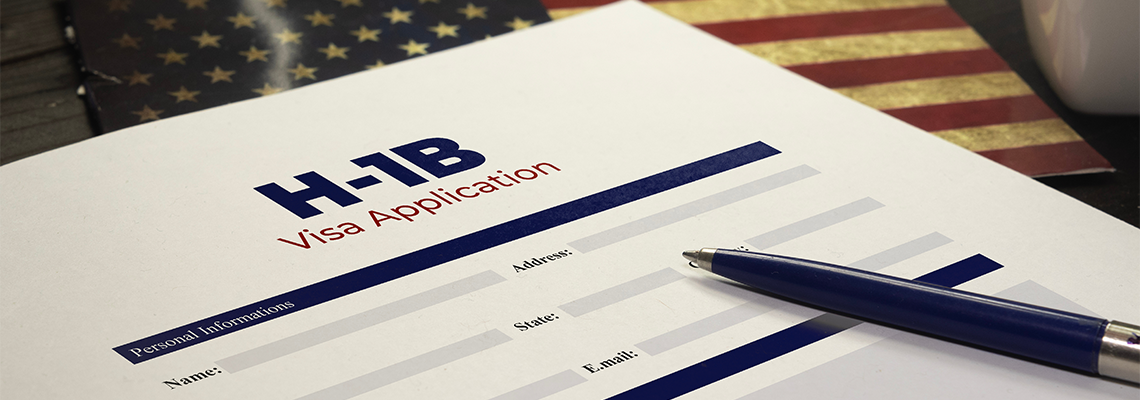
Bringing skilled workers to the U.S. can give businesses a competitive edge, but the H-1B visa process comes with specific rules and deadlines. Our Florida business immigration lawyer helps companies hire foreign talent while avoiding unnecessary delays or setbacks.
Whether you're hiring an IT specialist, engineer, or financial analyst, understanding the H-1B process is key to a smooth application. Serving Miami, Florida, VIA Lawyers is here to help. For many businesses, the H-1B visa program is an essential tool for securing top-tier talent in competitive industries.
With a limited number of visas available each year, companies must act fast and follow every step carefully. A single mistake or missed deadline could result in a denied petition. Understanding the process, from registration to compliance, can help businesses make informed hiring decisions and keep their workforce stable.
What Is an H-1B Visa?
The H-1B visa is a non-immigrant work visa that lets U.S. employers hire foreign workers in specialty occupations. These roles typically require at least a bachelor’s degree or equivalent experience. Industries like technology, finance, engineering, and healthcare frequently rely on H-1B visas to fill critical positions.
Since the H-1B program has an annual cap, employers must act quickly to secure a spot in the lottery system. The application process involves multiple steps, so working with a business immigration law attorney can help employers meet deadlines and avoid common pitfalls.
Who Qualifies for an H-1B Visa?
Before filing an H-1B petition, employers must confirm that both the job and the worker meet federal guidelines.
Job Requirements
To qualify as a specialty occupation, the position must meet at least one of the following:
A bachelor’s degree or higher is the standard requirement.
The job duties are so specialized that only a worker with a degree or equivalent experience can perform them.
The employer typically requires a degree for this role.
The job duties align with an industry-wide standard for requiring a degree.
Employee Qualifications
The employee must meet at least one of the following:
Hold a U.S. bachelor’s degree or higher related to the job field.
Hold a foreign degree equivalent to a U.S. bachelor’s degree.
Have a combination of education and professional experience that equals a bachelor’s degree.
Step 1: Register for the H-1B Lottery
Since demand for H-1B visas often exceeds the yearly cap, employers must enter a lottery system run by U.S. Citizenship and Immigration Services (USCIS). Registration typically opens in March, and employers must submit basic information about their business and the employee. If selected in the lottery, the employer can move forward with the full H-1B petition.
Employers should be aware that there are two caps:
Regular cap: The standard cap allows for 65,000 new H-1B visas annually.
Master’s cap: An additional 20,000 visas are set aside for workers with a U.S. master’s degree or higher.
Working with a business immigration law attorney can help businesses submit timely and accurate registrations.
Step 2: File a Labor Condition Application (LCA)
Before submitting an H-1B petition, employers must file an LCA with the Department of Labor (DOL). This document confirms that hiring a foreign worker won’t negatively impact U.S. workers. The employer must agree to:
Pay the H-1B worker at least the prevailing wage for the position.
Offer the same benefits as U.S. employees in similar roles.
Provide a safe and fair working environment.
The DOL typically takes about seven days to process an LCA. Once certified, the employer can move to the next step.
Step 3: Submit the H-1B Petition
Once the employer secures a lottery spot and an approved LCA, they can file Form I-129, the official H-1B petition. This form includes details about the company, the job, and the employee’s qualifications. Supporting documents may include:
The certified LCA.
Proof of the worker’s education and experience.
The job offer letter outlining duties and salary.
Copies of relevant business licenses or registrations.
USCIS may take several months to process an H-1B petition. Premium processing, which speeds up review times, is available for an additional fee.
Step 4: Wait for USCIS Approval
After filing Form I-129, employers must wait for USCIS to approve or request more evidence. Possible outcomes include:
Approval: The employee can begin working once their H-1B status becomes active.
Request for evidence (RFE): USCIS may ask for additional proof of eligibility. Employers should respond quickly to avoid delays.
Denial: If denied, the employer may consider alternative visa options.
A business immigration law attorney can help address RFEs and explore backup plans if USCIS denies the petition.
Step 5: Employee Visa Stamping and Travel
If the employee is outside the U.S., they must attend a visa interview at a U.S. embassy or consulate. The process typically involves:
Completing Form DS-160, the online visa application.
Scheduling an interview at the U.S. consulate in their home country.
Providing required documents, including the USCIS approval notice, passport, and job offer letter.
Once approved, the employee receives an H-1B visa stamp in their passport, allowing them to travel to the U.S. and start work on the designated date.
Maintaining H-1B Compliance
Employers must comply with H-1B regulations to avoid penalties or legal issues. One of the most important requirements is paying the H-1B worker at least the prevailing wage for the position.
If an employer fails to meet this obligation, they could face fines or even debarment from the H-1B program. Businesses must also keep detailed records of employment terms, including salaries and job descriptions, to show compliance with labor laws.
Additionally, any significant job changes must be reported to USCIS. If an employee moves to a different worksite or takes on new responsibilities, the employer may need to file an amended H-1B petition. Failing to report changes could lead to visa violations that affect both the employer and the employee.
If an H-1B worker is terminated before their visa expires, the employer may be responsible for covering the cost of their return travel. Employers should also keep all required documents easily accessible in case of a Department of Labor audit.
What If the H-1B Petition Is Denied?
If USCIS denies an H-1B petition, employers have several options. If the denial was due to missing or incorrect information, the employer may submit a corrected petition. In many cases, a simple clerical error can lead to a rejection, so carefully reviewing the petition before refiling can help prevent another denial.
For employees who don’t qualify for an H-1B visa, employers may consider alternative options. The L-1 visa allows multinational companies to transfer employees to U.S. offices, while the O-1 visa is available for individuals with extraordinary ability in their field. Some Canadian and Mexican professionals may also qualify for a TN visa under NAFTA agreements.
If the employer believes the denial was incorrect, they can file a motion to reopen or reconsider. This process requires strong legal arguments and supporting evidence. A business immigration law attorney can review the denial and determine whether an appeal is the best course of action.
Planning for the Future
Because the H-1B lottery is unpredictable, businesses should plan ahead when hiring foreign workers. Alternative visa options, such as the O-1 visa for individuals with extraordinary ability or the L-1 visa for intracompany transfers, may be worth considering.
Additionally, if an H-1B employee wants to stay in the U.S. long-term, the employer may sponsor them for a green card. This process should start well before the six-year H-1B limit expires.
Reach Out Today
Hiring skilled foreign workers can strengthen a business, but the H-1B process comes with strict deadlines and legal requirements.
A business immigration law attorney can help employers file accurate applications, respond to RFEs, and explore other visa pathways when needed. VIA Lawyers serves clients in Miami, Florida and surrounding areas. Get in touch today.

